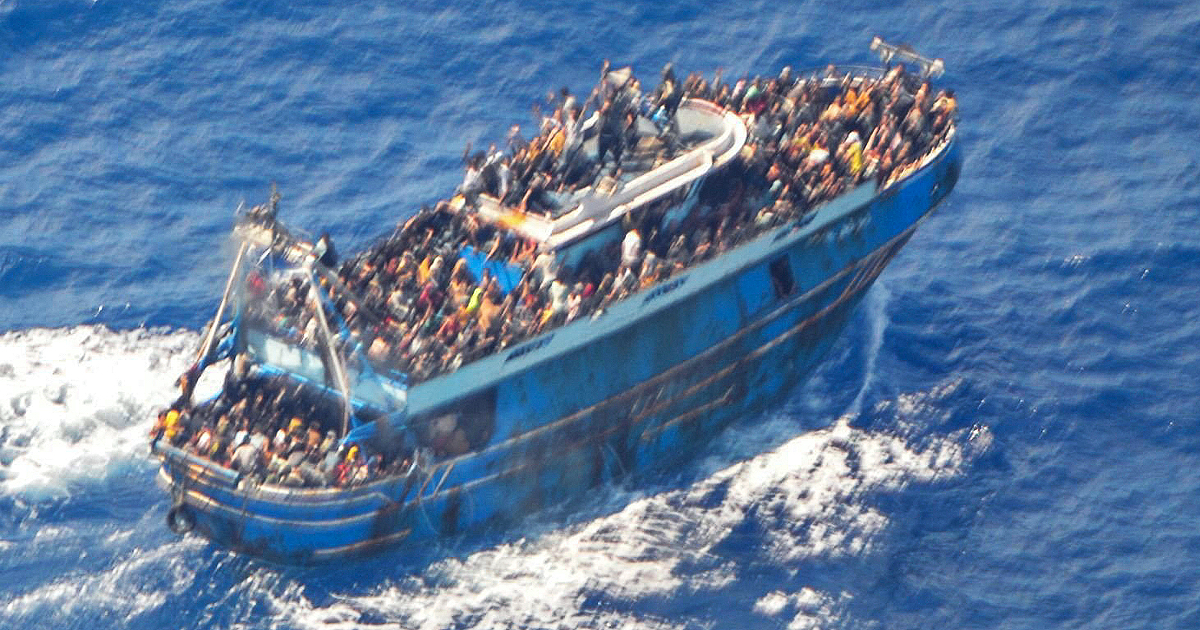The search for the missing was suspended and the Pakistani senate of Islamabad it is known that more than 300 Pakistani victims drowned in the sinking of the motor trawler which left from Dual use to Libya with 750 people and sunk on Tuesday 14 June South of Piles, 45 nautical miles from the Peloponnese coast of Greece. Meanwhile, the version of the Greek authorities is becoming increasingly fragile. To question the reconstruction offered by Coast Guard Of Athenswho had insisted on the refusal of help by the migrants, the report of the tanker commander also arrives Faithful Warrior, one of the cargo that reached the coordinates of the vessel in 7 hours which, even from satellite surveys, would not appear to have moved from its position. The commander Kostantinidis Panagiotis reports that he communicated to the Hellenic Search and Rescue Center at 21.45 on 13 June “that the fishing vessel it was swinging dangerously due to overcrowding on all decks”.
An objective danger situation, therefore, is the one signaled by the bridge of the Faithful Warrior, which after having brought water and food to the migrants’ boat reports the “reluctance of the master of the fishing vessel to collaborate with our vessel for assistance operations” and the launching of supplies into the sea by the people on board. All also reported to the Hellenic coordination center at 21:51, when the tanker is asked to step away and to keep at 5 nautical miles, “while at the same time a vehicle of the Greek Coast Guard approached the overcrowded vessel up to assistance distance, as it appeared on the electronic navigation instruments given the late hour”, writes the commander Panagiotis. After midnight, 00:30 on 14 June, the Greek coordination center relieved him and his ship from the search and rescue operation and invited him to continue his journey. When the tanker leaves, the captain reports, “the Coast Guard vessel was still next to the fishing boatas it appeared on our radar.”
A reconstruction that denies once more the one provided since the early hours by the Greek Coast Guard, concentrated on rejection of migrants to be rescued to avoid being landed in Greece when the destination was Italy. But as the UNHCR representative for the central Mediterranean also said Vincent Cochetel, “the boat was inadequate and, regardless of what some people on board may have said, the notion of danger cannot be discussed”. In other words, as the jurist wrote Fulvio Vassallo Palaeologus“the notion of distress, which requires immediate rescue intervention, cannot be the subject of discussion between shipwrecked and rescuers. In any case, people must be made safe, even by throwing life jackets, and transhipped as soon as possible”. A type of intervention that the Italian Coast Guard has also carried out several times, even in the face of overcrowded trawlers with hundreds of people on board. But it is precisely the intervention of the Coast Guard that needs to be clarified, starting from the possibility that a real rescue operation has never really begun.
From what emerged, also from the testimonies collected among the 104 survivors, the fishing boat would actually have been hooked by the Coast Guard with a cable. It remains to be understood whether this operation proved to be fatal for a boat which, with no more thrust from the engine and unstable due to her enormous load, risked capsizing. It is equally important to understand the nature of the decision to tow an overcrowded and unstable fishing vessel. Among the hypotheses also the one put forward by many NGOs who accuse the Coast Guard of having tried to drag the migrants out of Greek SAR waters (search and rescue) towards the Maltese SAR zone, despite the many miles to travel in those conditions. An operation to which the coastguard of Athens is not new. Last week 29 migrants were thus pushed back into Turkish territorial waters and then rescued off the coast of Dikili district, in the Turkish province of Izmir, according to a statement from the Turkish coast guard. Turkey and human rights groups have repeatedly condemned Greece’s illegal practice of turning back migrants, saying it “violates humanitarian values and international law by endangering the lives of vulnerable migrants, including women and children.”
Meanwhile, the confirmed victims rise to 80, and for Athens, which has launched an investigation requesting the collaboration of Europol and is currently hearing the 12 Egyptian survivors suspected of being traffickers, there are many things to clarify and the possibility of confirming the first official versions seems increasingly remote. Given the contradictions that have emerged, more and more voices are asking an international investigation and independent. The NGO Alarm Phone made available the communications received and forwarded to the Greek authorities, including the request for help from migrants on board the fishing vessel which eight hours before the tragedy, at 17:20 on 13 June, communicated: “The captain escaped with a lifeboat, please help us”. Also, the BBC has published the satellite surveys which, in addition to the many cargoes arriving at the position, would show how well 7 ore the fishing boat would not move. A point immediately questioned by a statement from the Greek Coast Guard published in response to news from the international press: “In total, the vessel covered a distance of about 30 nautical miles from the moment of detection to the moment of sinking”. As for the cameras of the Coast Guard patrol boat 920, which the authorities claim have been turned off, the investigative newspaper documentonews.gr argues instead that “on 15 June Miltiadis Zouridakis, lieutenant of the Coast Guard and captain of patrol boat 920 which approached the fishing vessel on the night of the sinking, duly presented audiovisual material and five photocopies of a boat’s logbook” to Coast Guard Lieutenant, Nikolaos Tsoulos.
